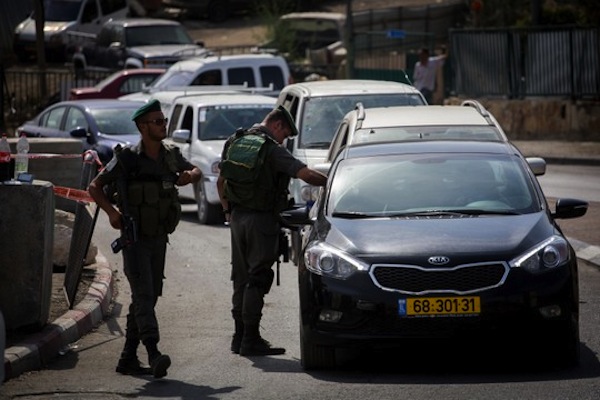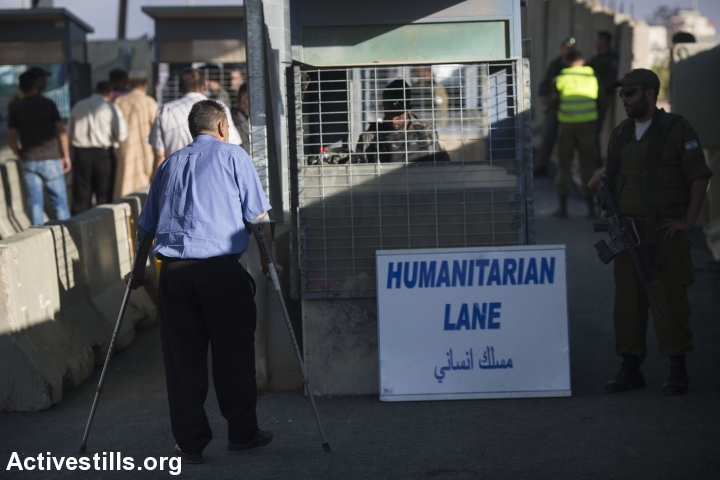It turns out that of the various tools of the occupation, traffic jams are the most common: an elegant and deliberate way of carrying out Israel’s collective punishment against Palestinians.
By Sahar Vardi

Several years ago, Palestinians saw the release of Azmeh (“traffic”), a mobile navigation app that helps them to circumvent the burdensome restrictions on movement in the occupied territories. As opposed to the Israeli navigation app, Waze, Azmeh equivalent maps not only traffic jams, but also their source: Israeli checkpoints.
Which checkpoint is causing trouble today? Where did the army establish a makeshift checkpoint that is holding up traffic? Which checkpoints are simply closed today? Like all other navigation apps, the goal is to bring drivers to their destination as fast as possible and with the least amount of traffic. But in Palestine, most traffic jams form for one reason.
This past week I drove along with another activist in East Jerusalem on Rabea al-Adwiyeh Road. This is the main road in the A-Tur neighborhood, which is home to the two largest Palestinian hospitals in Jerusalem, along with four schools. As we made our way, we suddenly discovered that the road had been blocked. Two police vehicles stood in the middle, blocking both lanes. Every so often a sleepy police officer would wave through the cars driving northward, creating traffic by forcing them to turn either left or right. So what if they are diverted to the wrong direction? At least they had where to go, as opposed to the cars driving southward, who were forced to simply sit and wait.
We got out of the car to try and understand what was happening, joining a group of Palestinians who gathered around the police officers, who wore bulletproof vests and held tear gas grenades and batons. A young Palestinian tried to translate the cries of an older man from the village, who demanded that the police open the road. The police responded that the road had been blocked because someone had thrown a stone. When? From what direction? Why does it matter? It doesn’t, because the police have to follow orders: every time someone throws a stone or shoots fireworks, they block the street. For how long? Until they become fed up. A young man who stood next to us said that this was the third time the road had blocked that day.

Our attempts to tell the police that blocking a main road as a form of collective punishment is not legitimate — especially when the road is located between two main hospitals in East Jerusalem — were cut off by ambulance silence. The ambulances that left Augusta Victoria Hospital was stuck in the traffic jam, and it took a few minutes until the police decided to open one lane to allow the vehicle to pass between all the cars that, at this point, were blocking both lanes. After all, why does it matter that an ambulance reach a sick or wounded Palestinian in time?
We stood for nearly half an hour without moving. Suffice it to say that not a single stone was thrown around us, nor were fireworks fired into the Jerusalem evening sky. Yet the police persisted — “for the sake of security.” When we called the police spokesperson to find out why the road was blocked, the only response we received was: “There was nothing unusual. If there was, we will issue a response.” Then she hung out.
The truth is that nothing unusual happened. It was not unusual for that day in which the road had been blocked three times. It is not unusual for a neighborhood where police forces regularly block roads, and where giant cinder blocks have been regularly help the police
It turns out that of the various tools of the occupation, traffic jams are the most common. It is an elegant way to carry out collective punishment. But as opposed to the traffic jams that Israelis are used to, these traffic jams are deliberate. We don’t need an application to solve them, we just need to put an end to the policy of collective punishment.
Sahar Vardi is an activist based in Jerusalem. This article was first published in Hebrew on Local Call. Read it here.
